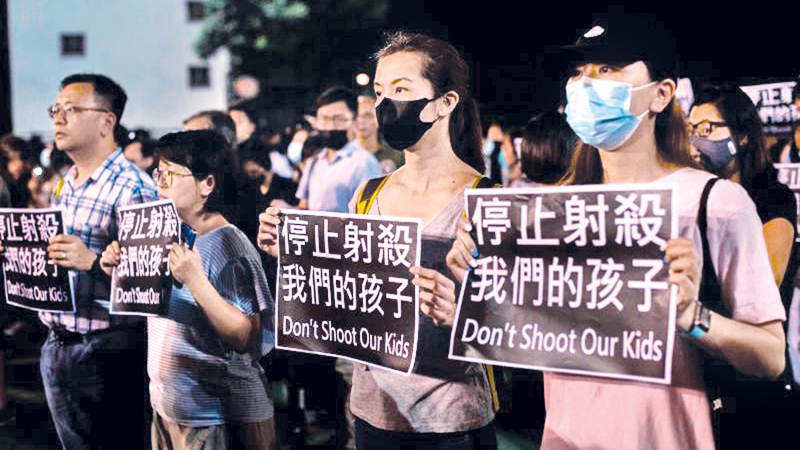Tweets aren’t enough. Washington must make clear that it expects Beijing to live up to its commitments—and it will respond when China does not.
As the Chinese Communist Party commemorates 70 years of the People’s Republic of China by parading its military hardware in Beijing, the people of Hong Kong are struggling for their rights. For months, the world has watched as protesters in Hong Kong stood bravely in the face of police and state violence. They deserve our support.
What is happening in Hong Kong illustrates the challenge posed by China and the limitations of the United States’ current approach. In many cases, the United States will need to cooperate with China—for example, on climate change—but it must also stand firm when its interests and values are threatened.
China’s economic policies undercut American workers. Its military ambitions and coercive diplomacy threaten peace in Asia and beyond. Its repression at home, including its treatment of the Uighur minority, and attacks on norms abroad risk eroding liberal values around the world.
Despite Beijing’s promise to maintain Hong Kong’s autonomy, in recent years, it has eroded key democratic institutions, leading hundreds of thousands of citizens to take to the streets to protest peacefully. In return, the government of Hong Kong has responded with repression and increasing violence.
Instead of standing up for the people of Hong Kong, U.S. President Donald Trump has repeatedly sent Chinese President Xi Jinping an unmistakably clear and dangerous message: The United States doesn’t care about Hong Kong and the principles at stake there—it cares only about a trade deal that serves Trump’s own interests.
Economic success
Hong Kong plays a unique role in the global economy and an essential role for China. That role is sustainable only if Hong Kong is allowed to retain its democratic orientation and traditions. The United States has a strong interest in Hong Kong’s continued economic success; the two had more than $67 billion in two-way trade in 2018. Chinese intervention would send shockwaves through the global economy at an already fragile moment.
The United States’ approach to the situation in Hong Kong must be grounded in a realistic approach to China. Getting China right takes more than bellicose tweets coupled with fawning summits—and more than uncoordinated and often counterproductive tariffs that burden ordinary Americans.
The United States must send a clear message that it and its partners expect China to live up to its commitments—and that they will respond when China does not. To send that message over the situation in Hong Kong, the United States should take two steps.
First, it must stop exports of police gear to Hong Kong. Protesters have asked for an independent investigation into the credible claims that the Hong Kong police have used excessive force. Until the report of such an investigation is released, the United States should stop all exports of U.S. security, police, or surveillance equipment to Hong Kong.
Second, it should provide temporary protected status or deferred enforced departure to Hong Kong residents. As the country did following Beijing’s 1989 crackdown on Tiananmen, the United States should protect Hong Kong residents involved in protests and who travel to the United States until they are confident that they will not be punished for exercising the right to peaceful assembly.
The current situation must be resolved peacefully through dialogue. And China needs to know that the United States has options if it resorts to force in Hong Kong.
Autonomy and freedoms
The United States should work with its partners in multilateral forums such as the United Nations and the World Trade Organization to make clear that it expects China to live up to its commitments to Hong Kong’s autonomy and freedoms. Although the United States’ specific response would depend on the situation on the ground, if China uses force in Hong Kong, Washington should consider freezing the assets of Chinese state security and other officials and companies complicit in committing violence against protesters, as well as imposing targeted sanctions on Chinese companies and individuals who do business in Hong Kong. These steps can create real costs for those promoting violence and limit the impact on U.S. and allied economies.
This is a moment for American leadership. The country needs a president capable of both advancing U.S. economic interests and standing up for America’s values, not one who sees the two as in conflict with one another. It needs a president who will rally America’s partners to counter aggression and repression and who will stand up to authoritarians around the world. The values the United States stands for—democracy and freedom of expression and assembly—are part of what differentiates it from autocracies like China and one of the reasons why the people of Hong Kong and others around the world look to this nation for hope. We cannot let them down.
- Foreign Policy



Add new comment